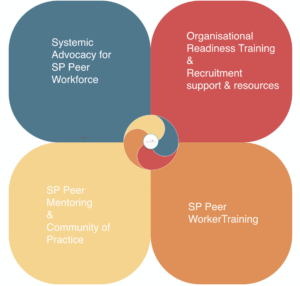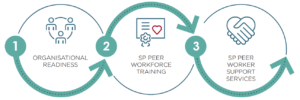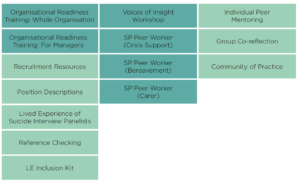Meeting specific professional needs
A peer workforce in suicide prevention has the potential to contribute significantly to addressing the crisis in the availability of support for people in distress being seen throughout Australia. It will simultaneously reduce pressure on clinicians, save money, contribute to system reform, and get help to more people more rapidly. Suicide prevention peer workers with the relevant lived experience of suicide are able to respond to the psychosocial factors and situational distress at the root of many suicidal crises. As a specialised workforce, SP Peer Workers have specific professional needs:
- A work environment that is strongly supportive in both policy and operational senses including at exec level
- Managers that value peer workers’ presence and understand their role
- Opportunities to reflect on their practice as peer workers
- Customised training in peer work and suicide prevention
- Opportunities to network with other peer workers and share experiences
Roses in the Ocean believes it is critical that a robust framework is implemented to bolster support for the emerging SP Peer Workforce.
Expanding the suicide prevention peer workforce:
An urgent and rapid solution to Australia’s suicide challenge
SP Peer Workforce Support Framework

Suicide Prevention Peer Workforce Development Services
Roses in the Ocean developed our suite of resources, training and support options to respond to the unique professional needs of the emerging Suicide Prevention Peer Workforce and to support the success of services to successfully integrate SP Peer Workers into their workforce and maximise their potential.
The suite of services includes:
- Training for managers, team leaders and clinicians to help them understand and work with SP Peer Workers alongside recruitment support.
- Specialised suicide prevention peer training
- Independent support services – Individual Peer Mentoring, Group Co-Reflection, Community of Practice
We have worked closely with some of Australia’s most highly regarded Peer Workforce experts from the Mental Health arena to determine what insights can be drawn from the development of the existing peer workforce, what barriers and challenges have been identified, and what supportive scaffolding is required to bolster the emerging SP Peer Workforce. It is important to capitalise on the excellent work that has come before us in the mental health sector, adapt and customise to meet the specific needs of the suicide prevention context.
The Framework is explicitly informed by the Self Help Addiction Resource Centre (SHARC) AOD Peer Work framework which was specifically designed for the purposes of articulating the independent infrastructure required to support an effective and sustainable peer workforce for a specific lived experience context and cohort related to, but distinct from, mental health.
Specialised suicide prevention peer training
Roses in the Ocean currently offers suicide prevention training for organisations only. If you’re interested in training, please enquire through your team’s channels.
SP Peer Worker programs: creates a supportive and non-judgmental space for SP Peer Workers to consider the practice guidance provided by general Peer Work courses, such as Intentional Peer Support and the Certificate IV in Mental Health Peer Work, and gain understanding and skill in applying this in the context of suicide prevention. Participants explore how lived experience, peer relationships and communication skills can be used to reduce the emotional pain and loss associated with a suicide.
It specifically focuses on what Peer Work values, principles and approaches mean in the challenging environment of a suicide prevention service and how to work in situations that are unique to this environment. It cultivates in SP Peer Workers a pride in the unique characteristics of peer led suicide support and an understanding of its value, which is essential for moderating stress associated with the role, workplace advocacy and the strengthening of the SP Peer Workforce. Most importantly, the SP Peer Worker Program provides the opportunity for peers to contemplate their lived experience of suicide and the factors that shape their perspective on suicide so that they may explore the role these might play in their support work.
- SP Peer Worker (Crisis): for people with lived experience of suicidal crisis working in non-clinical safe spaces, blended workforce services such as Suicide Prevention Outreach Teams etc.
- SP Peer Worker (Bereavement): for people with lived experience of suicide bereavement working in post suicide support services, bereavement support groups etc.
- SP Peer Worker (Carers): for people with lived experience of caring for loved ones through suicidal crisis working in services providing support to family, kin, partners and friends.
- SP Peer Worker (Youth): for people with lived experience of suicide working in services providing support to youth and young adults.
View SP Peer Worker program outline
In order to provide optimum lived experience peer support, ‘peer matching’ is crucial. The success of peer work across various suicide contexts relies on matching the nature of lived experience. For example . . . people who have experienced their own suicidal thoughts and/or made an attempt on their life are best placed to support others going through similar experiences; people bereaved through suicide are best placed to support people recently bereaved themselves; carers of people in suicidal crisis are best placed to provide insight and support to other carers.
Similarly, it is important to be able to match people with peers with similar life and cultural experience (eg Alcohol & Other Drugs / Mental Illness / LGBTIQ / specific ages / Aboriginal & Torres Strait Islander / CALD).
Organisational readiness training and support services
Understanding and working with suicide prevention peer workers
Roses in the Ocean has developed its workshop on Understanding and Working with Suicide Prevention Peer Workers to meet the needs of suicide prevention services who already engaging or who are preparing to diversify their workforce by hiring people who have a lived experience of suicide into suicide prevention peer worker roles. The workshops can be facilitated face-to-face or online.
PART 1: FOR WHOLE ORGANISATIONS
Part 1 of this workshop (4 hours) provides skills and knowledge for everyone who works within your suicide prevention service so that you can work together to build an inclusive and supportive workplace for Suicide Prevention Peer Workers. This introductory training is designed for managers, team leaders, clinicians, administrative staff and anyone who will be interacting with your Suicide Prevention Peer Workers as part of their work role. The training demystifies Suicide Prevention Peer Work, provides new perspectives, builds confidence for working together and cultivates enthusiasm for the contribution that Suicide Prevention Peer Workers will make to your service.
PART 1: FOR MANAGEMENT
Part 2 of this workshop (2 hours) is for people in leadership positions in your organisation who are involved in the line management of Suicide Prevention Peer Workers. This specialised workshop provides skills and knowledge for managers who provide these peer workers with support, guidance and direction. It provides information on the responsibilities of managers of people with a lived experience of suicide and how to meet these responsibilities while respecting the strength and ability of Suicide Prevention Peer Workers.
Independent SP Peer Workforce Support Services
The SP Peer Workforce Support Framework, developed by Roses in the Ocean, builds on the considerable work already undertaken by the Mental Health Peer Work sector at a regional, state, and national level, but is explicitly informed by the Strategy for the Alcohol and Other Drug Peer Workforce in Victoria produced by the Self Help Addiction Resource Centre (SHARC, 2019). This is because SHARC’s AOD Peer Workforce Strategy offers the most pertinent example of how to develop, support, and sustain a contemporary Peer Workforce that is responsive to a specific lived experience context. It harnesses the strengths of the Mental Health Peer Workforce model, but is also individually tailored to suit the particular needs of lived experience contexts and cohorts distinct from the mental health sector.
Our SP Peer Workforce Support Services provide a comprehensive program of peer support:
Individual peer mentoring meets the ongoing professional support and development needs of the Suicide Prevention Peer Workforce. We offer Suicide Prevention Peer Workers the opportunity to co-reflect with a highly skilled Peer Worker who has extensive experience of sharing their lived experience of suicide for the purpose of suicide prevention.
Suicide Prevention Peer Workers benefit from the opportunity to speak openly and freely with someone who is independent from their workplace. We provide a safe space where ideas can be tested, stigma can be challenged and fears can be dispelled. Our Peer Mentors are well placed to support and motivate peer workers to have important conversations with their managers when they are reluctant to do so.
Our Peer Mentors are chosen for their lived experience of suicidal crisis, their deep understanding of peer values, principles and approaches and their skill at facilitating solutions-focused conversations. They are trained to use reflection and coaching models that have been specifically developed to meet the needs of the Suicide Prevention Peer Workforce.
Group Co-reflection is an opportunity for Suicide Prevention Peer Workers in your team to provide mutual support, discuss shared challenges and learn from each other’s experiences.
In addition to supervision from their managers, Suicide Prevention Peer Workers have workplace needs that are best met through structured and solutions-focused conversations with other peer workers. Group co-reflection sessions are an opportunity for important conversation about practice and the role of peer workers in suicide prevention teams.
Suicide Prevention teams benefit from the opportunity to speak openly and freely in a confidential space with the guidance of someone who is independent from their workplace. Peer workers are invited to explore shared challenges and identify steps they can take to support each other in professional growth. Our Peer Mentors draw each team member into the conversation and encourage active participation using reflection and coaching models that have been developed for use with groups.
Communities of Practice can be established to bring together suicide prevention peer workers working across a number of sites, services or projects with a view to sharing learnings, collectively problem solving and celebrating successes.
Recruitment support
We offer organisations a range of support services to assist in the recruitment of the most suitable lived experience candidate to work in your suicide prevention service. Organisations may choose to use all of these services or select those that best meet their recruitment needs.
- Job advertisement
- Position description development
- Applicant review
- Expert interview panel support
- Referee checks


The Emerging Suicide Prevention Workforce: Exploring Opportunities for Parallel Paid and Volunteer Roles
Our CEO Bronwen Edwards speaks about the emerging suicide prevention workforce: exploring opportunities for parallel paid and volunteer roles at the Mental Health Academy 2022 Suicide Prevention Summit.
Lived experience and Suicide Prevention Peer workforces
It is important to draw attention to the distinction between the overarching Lived Experience of Suicide Workforce and the subset of this, the Suicide Prevention (SP) Peer Workforce.
The broader Lived Experience of Suicide Workforce encompasses people with a lived experience of suicide working and volunteering in a variety of roles including advisory groups, policy, research, service enhancement, co-design, regional strategic planning, community initiatives and so on. A range of lived experience capacity building is offered by Roses in the Ocean to support people to develop their lived experience skills to compliment other expertise and engage in their areas of interest.
The SP Peer Workforce is a specific role requiring very specific skill development, expertise and experience to work in Peer Support Worker roles across the continuum of suicide prevention from supporting people experiencing suicidal crisis and post attempt, through to carers and those bereaved through suicide.
With the current appetite for, and investment in, non-clinical options of care and support within suicide prevention, there is an urgent need for the parallel development of a diverse peer workforce, consisting of people with a lived experience of suicide.
The rapidly growing momentum for people with a lived experience of suicide to provide critical peer support roles embedded into services, and indeed for peer led services, has put immediate pressure on the development of a specialised lived experience of suicide peer workforce, and the need for consistency across Australia in peer workforce frameworks, skill development and support structures.
There is much to be learnt from the well established peer workforce in the mental health sector, but it is crucial that the nuances of peer support within the suicide context is not forgotten, and that special consideration is given to the different recruitment, skill development and support mechanisms required.
Of course, many people with a lived experience of suicide are already involved in suicide prevention across a wide range of roles, paid and voluntary. The emerging SP Peer Workforce will add to this ever growing lived experience workforce.
